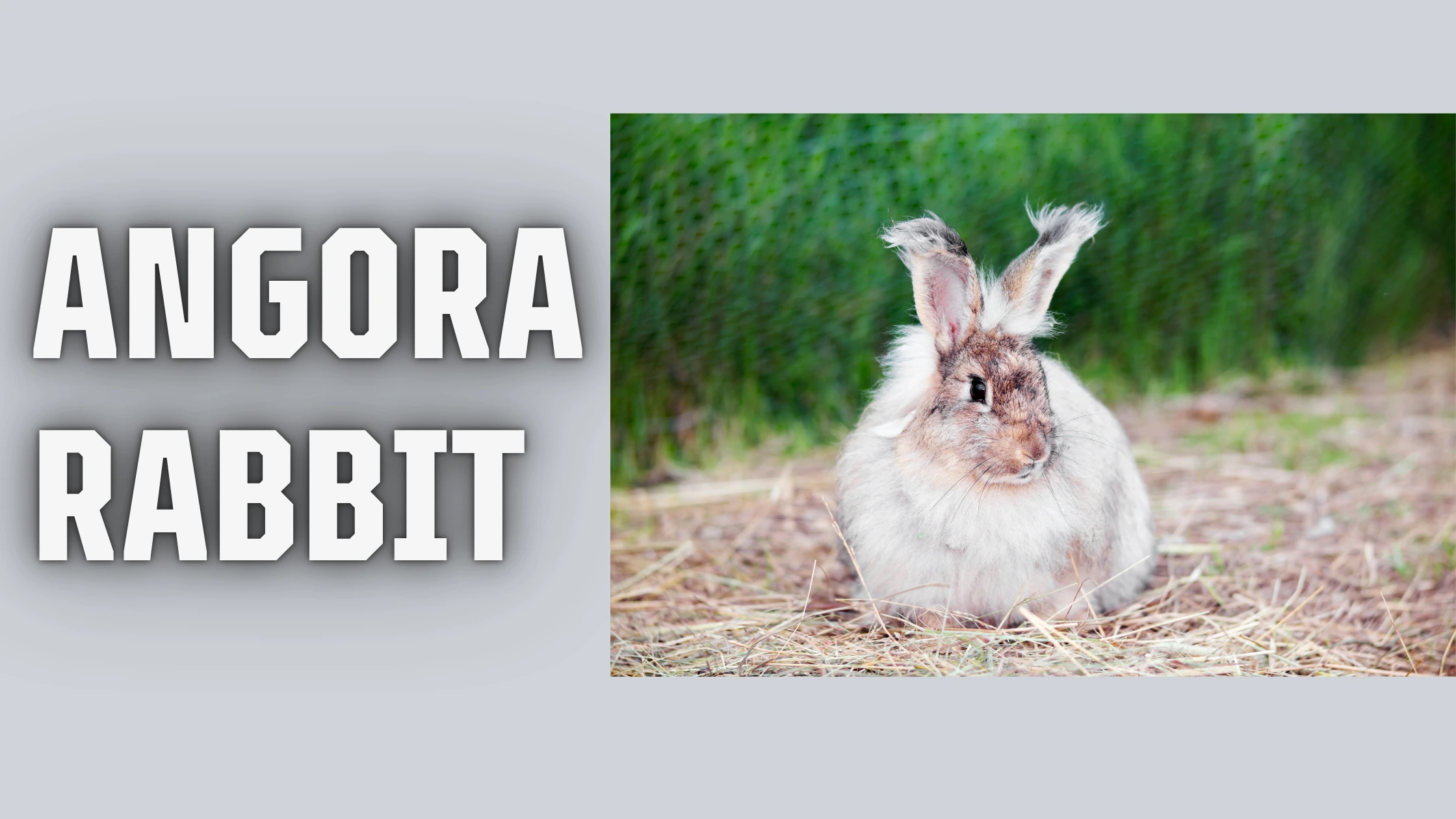If you’re a rabbit enthusiast or considering adding an Angora rabbit to your home, you’re in for a treat! These fluffy, soft creatures are not only adorable but also make great pets for the right owner. Angora rabbits are known for their long, luxurious fur, but there’s much more to these bunnies than meets the eye. In this comprehensive guide, we’ll cover everything you need to know about Angora rabbits, including their characteristics, lifespan, care needs, and more!
What Is an Angora Rabbit?
The Angora rabbit is one of the oldest and most famous breeds of domestic rabbits, originally bred for its fine, silky fur. Known for its long, woolly coat, the Angora rabbit is part of a group of breeds collectively known as “wool rabbits.” This breed’s fur is highly prized for its softness and is often used in the textile industry to make luxurious garments, blankets, and yarn. However, owning an Angora rabbit as a pet requires a certain level of care, especially when it comes to grooming.
Characteristics of Angora Rabbits
Angora rabbits are often recognized by their distinct appearance, which includes a large, round body and abundant fur. Here are some key characteristics:
- Fur: The most striking feature of the Angora rabbit is its long, dense wool coat. Their fur can grow up to 4-5 inches long and requires regular maintenance to prevent matting.
- Size: Angora rabbits can range in size, with some varieties weighing between 5-10 pounds. They have a solid build but are still quite agile and graceful.
- Color: Angora rabbits come in a variety of colors, including white, black, gray, brown, and a mix of these shades. Some breeds also have specific color patterns.
- Temperament: Angora rabbits are generally gentle, docile, and friendly. They can be very social and enjoy spending time with their owners. While they may be a bit more skittish than other rabbit breeds, with patience, they can become very affectionate and trusting.
Lifespan of Angora Rabbits
On average, Angora rabbits live for about 7 to 12 years. However, with proper care, they can live longer. Their lifespan can be influenced by factors like diet, living environment, and grooming habits. To ensure a long, healthy life for your Angora, make sure they get enough exercise, a balanced diet, and regular veterinary checkups.
Care and Maintenance of Angora Rabbits
Owning an Angora rabbit comes with specific responsibilities, particularly when it comes to their grooming needs. Here are some essential care tips:
1. Grooming:
Angora rabbits have very thick fur that grows continuously, which can easily become tangled or matted if not properly cared for. You’ll need to brush them regularly, at least once a week, but some Angoras may require daily grooming depending on the length of their coat. To avoid mats, use a gentle comb or a slicker brush designed for long-haired animals. Trimming the fur around the paws and behind the ears can also help prevent mats from forming.
2. Diet:
A balanced diet is essential for your Angora rabbit’s overall health. Provide a mix of high-quality hay (like timothy hay), fresh vegetables, and rabbit pellets. Avoid feeding your Angora too many sugary fruits or treats, as they can lead to obesity or digestive issues. Fresh water should always be available, either in a water bottle or bowl.
3. Exercise:
Angora rabbits are active creatures and benefit from plenty of exercise. Give them time outside their cage every day, ideally in a safe, enclosed space. This will help them maintain a healthy weight and avoid becoming bored, which can lead to destructive behavior.
4. Living Environment:
Your Angora rabbit needs a clean, safe, and quiet living space. Their enclosure should be large enough for them to hop around, stretch out, and move freely. The bedding should be absorbent, such as paper bedding or aspen shavings. Keep their living area free from direct drafts or excessive heat, as extreme temperatures can be harmful.
5. Health Care:
Angora rabbits are prone to certain health issues, such as dental problems, digestive issues, and skin infections, especially if their fur isn’t groomed regularly. It’s essential to monitor their health closely and make sure they have routine checkups with a vet who specializes in rabbits.
Types of Angora Rabbits
There are several breeds of Angora rabbits, each with its own unique characteristics:
1. English Angora
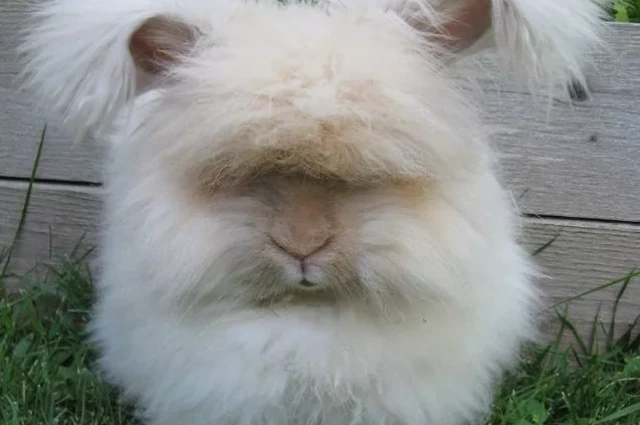
Weight: 2.0-3.5 Kg
This breed is perhaps the most popular and is known for its fine, silky wool. They tend to have the longest and most dense coats. Before 1939 there was one breed known as Angora Wooler and in 1944 ARBA officially separated Angora rabbits into two breeds English Angora and French Angora
2. French Angora
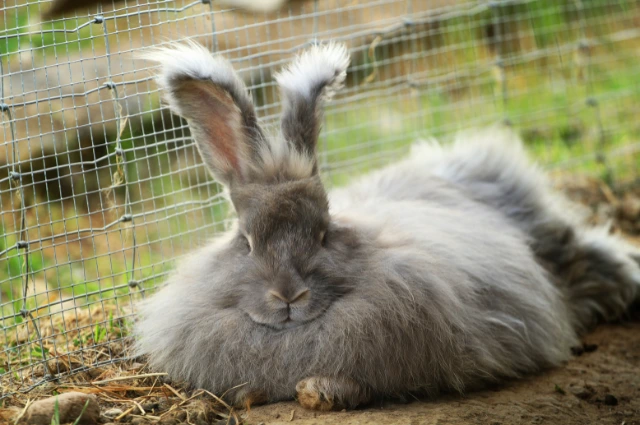
Weight:- 3.5-4.5 Kg
These rabbits have slightly shorter coats than the English Angora but still produce high-quality wool. They are easier to care for since their coats are less prone to matting.
3. Giant Angora
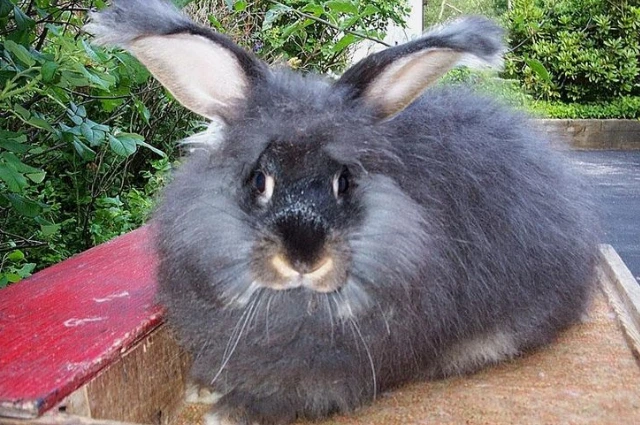
Weight:- Minimum 5.4 Kg
As the name suggests, these rabbits are larger than the average Angora. They have a similar coat to the French Angora but produce more wool due to their size.
4. Satin Angora
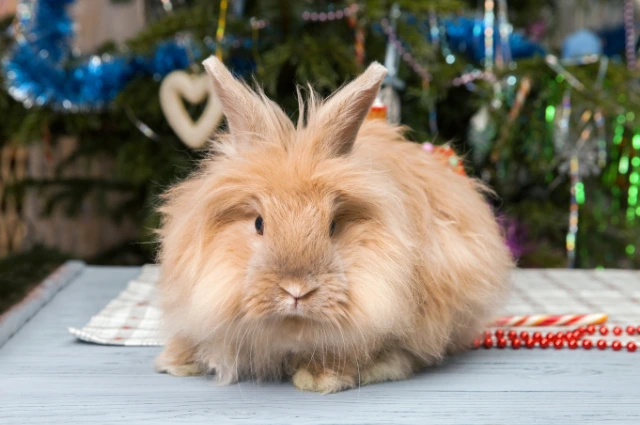
Weight:- 3.0-4.5Kg
Satin Angora Rabbit developed in late 1970s by Mrs. Meyer of Holland Landing and known for their shiny, glossy fur, Satin Angoras are a variation of the English Angora. Their wool has a distinctive sheen, which makes it particularly desirable in the textile industry.
Breeding Angora Rabbits
Breeding Angora rabbits can be an exciting endeavor, but it comes with its own set of challenges. Due to their thick fur, it’s essential to choose healthy breeding pairs to avoid genetic issues or complications during birth. Additionally, breeding Angoras for wool can be done sustainably, as their fur needs to be sheared or plucked regularly.
Are Angora Rabbits Good Pets?
Angora rabbits can make wonderful pets for the right person or family. They are friendly and social, and they thrive in environments where they are treated with love and care. However, they are best suited for owners who are prepared to handle the grooming and care demands. If you’re willing to dedicate time to grooming and providing proper care, owning an Angora rabbit can be a rewarding experience.
Conclusion
Angora rabbits are unique, charming pets that bring joy to their owners with their soft, fluffy fur and gentle personalities. With the right care, they can live long and healthy lives, making them a great addition to any home. Just be prepared for the responsibility that comes with grooming and maintaining their beautiful coats.
If you’re thinking about adopting an Angora rabbit, make sure you’re ready to invest the time and effort into caring for them properly. With the right approach, you’ll be rewarded with a loyal and loving companion for many years to come.
By following this guide, you’ll be well on your way to understanding and caring for your Angora rabbit. Whether you’re a seasoned rabbit owner or a beginner, the effort you put into providing proper care will ensure a happy, healthy, and fluffy friend for years to come.
